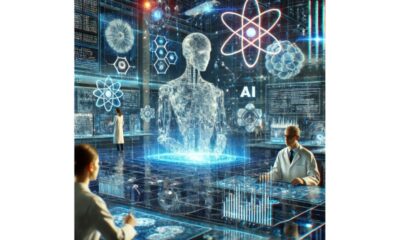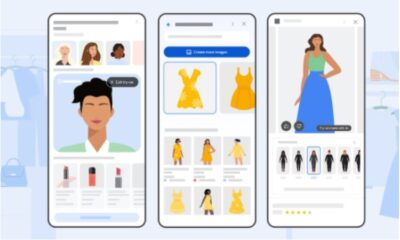Tech
How AI Is Shaping the Future of Healthcare

Artificial intelligence (AI) brings unprecedented advancements and possibilities to the healthcare industry. The integration of AI into healthcare changes how medical professionals diagnose, treat, and manage patient care. From enhancing diagnostic accuracy to personalizing treatment plans, AI is making healthcare more efficient and effective. These innovations are not just theoretical but are being implemented in real-world scenarios, demonstrating significant benefits for patients and providers alike. The impact of AI on healthcare is expected to grow exponentially. This blog explores five keyways AI is shaping the future of healthcare.
1. Enhancing Diagnostic Accuracy
The top AI in healthcare companies are making significant strides in improving diagnostic accuracy. Advanced AI algorithms can analyze medical images, such as X-rays, MRIs, and CT scans, to identify abnormalities with high precision. These algorithms can detect patterns and anomalies that might be missed by the human eye, leading to early detection of diseases like cancer and cardiovascular conditions. For instance, AI-powered tools have demonstrated remarkable accuracy in identifying breast cancer in mammograms, often outperforming human radiologists. In addition to imaging, AI is revolutionizing the analysis of genetic data and laboratory results. Machine learning models can process vast amounts of genetic information to identify genetic markers associated with specific diseases. This capability allows for early intervention and personalized treatment plans tailored to an individual’s genetic makeup.
2. Personalizing Treatment Plans
Personalized medicine is becoming a reality thanks to AI. It can analyze a patient’s genetic information, medical history, and lifestyle factors to create customized treatment plans. Personalization ensures that patients receive therapies that are specifically tailored to their unique needs, maximizing effectiveness, and minimizing side effects. AI also can be used to continuously monitor and adjust treatment plans. By analyzing data from wearable devices and other monitoring tools, AI can track a patient’s progress and make necessary adjustments to the treatment regimen.
3. Streamlining Administrative Processes
AI makes administrative operations more efficient and reduces the burden on healthcare providers. One significant area of impact is the management of electronic health records (EHRs). AI-powered systems can automatically update and organize patient records. Automation reduces the time healthcare providers spend on administrative tasks, allowing them to focus more on patient care. AI also enhances the efficiency of scheduling and resource allocation. Predictive analytics can forecast patient demand and optimize staff schedules, ensuring that healthcare facilities are adequately staffed at all times. This reduces wait times for patients and improves the overall efficiency of healthcare delivery.
4. Supporting Remote Monitoring and Telehealth
The integration of AI with remote monitoring and telehealth makes healthcare more accessible and convenient for patients. AI-powered remote monitoring systems can track patients’ vital signs and health metrics and alert healthcare providers to any concerning changes. This is particularly beneficial for patients with chronic conditions, as it enables timely interventions and reduces the need for frequent in-person visits. For example, AI can monitor glucose levels in diabetic patients and provide real-time feedback, helping them manage their condition more effectively. Telehealth services are also benefiting from AI advancements. AI chatbots and virtual assistants can handle routine inquiries, triage patients, and provide basic medical advice, freeing up healthcare professionals to focus on more complex cases.
5. Advancing Drug Discovery and Development
AI is accelerating the drug discovery and development process, which has traditionally been time-consuming and costly. Machine learning algorithms can analyze vast datasets, including biological data, chemical properties, and clinical trial results, to identify potential drug candidates more efficiently. This capability allows researchers to predict how different compounds will interact with specific targets in the body, reducing the time required to identify promising new drugs. AI can optimize clinical trial design and execution. By analyzing patient data, AI can identify suitable candidates for trials and predict potential outcomes, ensuring that trials are conducted more efficiently and with higher chances of success. AI can also analyze real-time data from ongoing trials to detect any issues early and make necessary adjustments.
Conclusion
AI is shaping the future of healthcare. It offers numerous benefits that enhance patient care, streamline operations, and accelerate medical research. From improving diagnostic accuracy and personalizing treatment plans to streamlining administrative processes and supporting remote monitoring, AI is revolutionizing the healthcare industry. These advancements are making healthcare more efficient, accessible, and personalized, ultimately leading to better patient outcomes and higher satisfaction levels. As AI technology continues to evolve, its impact on healthcare will only grow, providing even more innovative solutions to the challenges faced by the industry.
-

 Business4 weeks ago
Business4 weeks agoNayef Doleh Examines International Humanitarian Fundraising Strategies
-

 Business3 weeks ago
Business3 weeks agoHow to fill MSME Form 1? Step-by-Step Guide
-

 Festivals & Events4 weeks ago
Festivals & Events4 weeks agoInteresting Facts about St. Patrick’s Day
-
Business3 weeks ago
From Marine to Chief: The Leadership Journey of Sean Mannix
-

 Festivals & Events3 weeks ago
Festivals & Events3 weeks agoGoogle Celebrates Cherry Blossom Season with Animated Doodle
-

 Gadget3 weeks ago
Gadget3 weeks agoAfter Grand Success on BLDC Ceiling Fan, Eff4 Is Launching Smart Bulb
-

 Sports4 weeks ago
Sports4 weeks agoKabaddi World Cup 2025: Full Schedule, Fixtures, Match Date, Time and More
-

 Book4 weeks ago
Book4 weeks agoNavigating Life’s Rope Bridges: Dr. Lynda’s Transformative Guide to Change





















